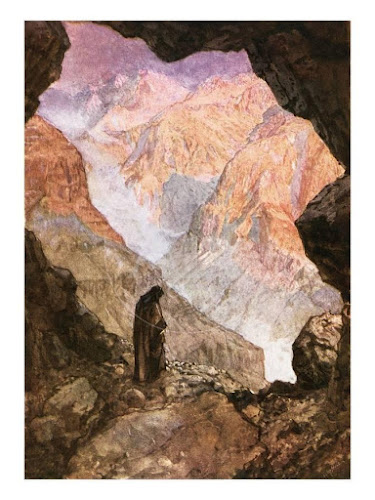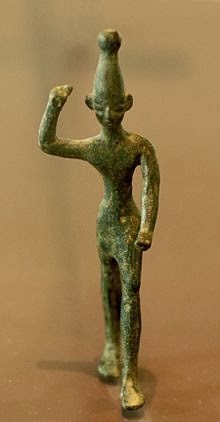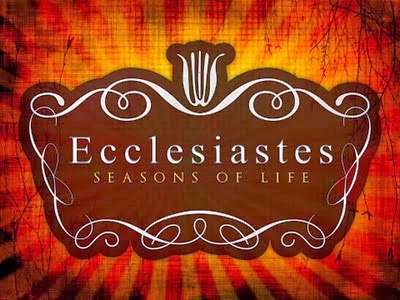It came to pass after this also, that the children of Moab, and the children of Ammon, and with them other beside the Ammonites, came against Jehoshaphat to battle. - 2 Chronicles 20:1
“It came to pass.” The phrase occurs again and again in the Old Testament. “It came to pass after four hundred and thirty years that all the hosts of the Lord went out from the land of Egypt,” and, “It came to pass, when the evil spirit from God was upon Saul, that David took the harp and played with his hand,” and so on. But has it ever occurred to you that the phrase is a very suitable one as describing the different events of earthly history and the varied phases of earthly experience? It hints not only that they happen, but that they are so soon over; they come, but they “come to pass.” We do not always realise that, but it is always true. We are not conscious that the earth is moving round the sun, or that it is revolving daily on its axis, yet it is true. Summer and winter, day and night, do not cease, there is perpetual movement.
I. All that comes to us here “comes to pass,” nothing lasts very long, “weeping may endure for a night, but joy cometh in the morning.” It is true a Christian has an abiding joy, it is joy that springs from an inward life, but joys that are ours through happy circumstances, through successes, recoveries, attainments, meetings, of these it is as true as of their opposites that give us trouble, they “come to pass.”
Each period of life comes to pass. Childhood, how swiftly gone! Soon the soft limbs grow robust, the hair loses its flaxen tint; and youth, with its gaiety, novelty, and romance, it comes so quickly, but it “comes to pass.” And, of course, this is equally true of all that we mean by the word “opportunity.” Thomas a Kempis says, “The wealth of both Indies cannot redeem one single opportunity which you have once let slip.”
Every day as it passes takes with it in its hand the opportunities that we have slighted and refused to take. The feeling of irritation that you have under trying circumstances. Things have not gone as you wish. Things do go strangely sometimes. So much disappointment and trouble are caused by one screw being loose somewhere. Well, the thing has come, but remember, like everything else, it has “come to pass.”
Or it may be something much more serious than that. A reversal of fortune, the failure or death of one who, if not the sharer in your heart’s affections was one whose presence and favour were of great value to you. That great crisis of yours came, but it “came to pass.” God guided you into the wilderness that He might speak comfortably to you. The stormy night full of terrors brought the vision and the morning.
But some may be reminding the speaker in the silence of their own thought, there are sorrows in life that come to stay. Yes, you may say, it is the greater griefs, the darker dispensations, that come but do not “come to pass.” In proportion to the depth of the wound is its permanency.
And yet, even in regard to the greater sorrows that come to us in life there is an example of that which the text expresses. Wounds heal, though the marks of them abide, and though in some cases, like Jacob after the night of wrestling, we halt upon our thigh, there is an assuaging influence in time; the intense grief, the sense of despair, the feeling that all has gone, that life has no recuperative power, and that there is nothing worth living for—of these feelings it is true they come, but they “come to pass.”
Is not this equally true of very opposite experiences? Though successes and the honours of the world may remain, yet the first feeling of elation and pride of attainment, these “come to pass.” We get accustomed to success, it ceases to exhilarate, it no longer gives us satisfaction.
II. Now having given, I trust, sufficient illustrations of this phase of life, of the constant flux of transitory things—they come, but they “come to pass”—let us consider its religious significance.
What does it teach us, how should it affect us?

1. What an emphasis it lends to the fact of our own continuance, the continuity of the personal life through all the changes of time! How much has come to pass! Youth, marriage, parentage, maturity, the successive seasons and steps in life, have come to pass. Friends, and even the nearest and dearest of all, have come to pass. We ourselves have changed. There is not a physical atom of our bodies that belonged to us ten years ago; the gait, the expression, all have changed. But all that makes the continuity of the I, the fundamental elements of our humanity, the more striking. I am the same being that long years ago first spoke God’s name at my mother’s knee; the same being as when health gave vigour to the limbs and youth fresh beauty to the cheek; the same being who, once a prodigal son far from God, rioting in pleasure, then miserable in the consciousness of spiritual pauperism, came back unto the Father. The essence, the very constitution of man, is within, it is hidden, it is that which abides. Surely then there is nothing unreasonable in the faith that I may survive the last change of all? “The world passeth away and the lust thereof, but he that doeth the will of God abideth for ever.”
2. Then should not the fact that most, if not all, things only “come to pass” have a moderating influence on passion? The things in life which we most regret are moments when we lose control of ourselves. Said Johnson to Boswell, when something had intensely irritated that inimitable biographer, “Consider, sir, how insignificant this will appear six months hence.” Boswell’s comment on relating it is, “Were this consideration applied to most of the little vexations of life by which one’s quiet is too often disturbed, it would prevent many painful sensations.” Exactly. There is a great argument for temperance in this text. “It came to pass.”
3. Surely, too, this should affect our judgment as well as our feelings. Permanency must be a factor in judgment. Should it not guide us to choose and cherish the good that abides, the better part that cannot be taken away from us? Character is an abiding thing; the evil effects as well as the good effects are lasting, but the pleasure only comes to pass; no one can enjoy the pleasures of sin more than for a season, but “he that doeth the will of God abideth for ever.” Surely, too, this should affect our judgment of movements of thought and taste, schemes that men devise for benefiting the race, will they last? Are they only a passing phase, a fashionable craze, a novelty, attractive because it is new? Here they are, they have come; wait a little, and you will see that they have only “come to pass.” The Word of God abides, the Christ the Sun of Righteousness is still the sun of the moral world. The Bible has been attacked ever since there was a Bible.
-Excerpted from the Biblical Illustrator--a collection of Bible commentary from various authors. This passage is by R. Baldwin Brindley.
II. Now having given, I trust, sufficient illustrations of this phase of life, of the constant flux of transitory things—they come, but they “come to pass”—let us consider its religious significance.
What does it teach us, how should it affect us?

1. What an emphasis it lends to the fact of our own continuance, the continuity of the personal life through all the changes of time! How much has come to pass! Youth, marriage, parentage, maturity, the successive seasons and steps in life, have come to pass. Friends, and even the nearest and dearest of all, have come to pass. We ourselves have changed. There is not a physical atom of our bodies that belonged to us ten years ago; the gait, the expression, all have changed. But all that makes the continuity of the I, the fundamental elements of our humanity, the more striking. I am the same being that long years ago first spoke God’s name at my mother’s knee; the same being as when health gave vigour to the limbs and youth fresh beauty to the cheek; the same being who, once a prodigal son far from God, rioting in pleasure, then miserable in the consciousness of spiritual pauperism, came back unto the Father. The essence, the very constitution of man, is within, it is hidden, it is that which abides. Surely then there is nothing unreasonable in the faith that I may survive the last change of all? “The world passeth away and the lust thereof, but he that doeth the will of God abideth for ever.”
2. Then should not the fact that most, if not all, things only “come to pass” have a moderating influence on passion? The things in life which we most regret are moments when we lose control of ourselves. Said Johnson to Boswell, when something had intensely irritated that inimitable biographer, “Consider, sir, how insignificant this will appear six months hence.” Boswell’s comment on relating it is, “Were this consideration applied to most of the little vexations of life by which one’s quiet is too often disturbed, it would prevent many painful sensations.” Exactly. There is a great argument for temperance in this text. “It came to pass.”
3. Surely, too, this should affect our judgment as well as our feelings. Permanency must be a factor in judgment. Should it not guide us to choose and cherish the good that abides, the better part that cannot be taken away from us? Character is an abiding thing; the evil effects as well as the good effects are lasting, but the pleasure only comes to pass; no one can enjoy the pleasures of sin more than for a season, but “he that doeth the will of God abideth for ever.” Surely, too, this should affect our judgment of movements of thought and taste, schemes that men devise for benefiting the race, will they last? Are they only a passing phase, a fashionable craze, a novelty, attractive because it is new? Here they are, they have come; wait a little, and you will see that they have only “come to pass.” The Word of God abides, the Christ the Sun of Righteousness is still the sun of the moral world. The Bible has been attacked ever since there was a Bible.
-Excerpted from the Biblical Illustrator--a collection of Bible commentary from various authors. This passage is by R. Baldwin Brindley.
















